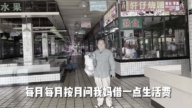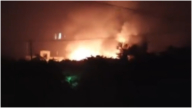【新唐人2011年11月3日訊】日前,中國廣東珠海市傳來推出樓市「雙限」新政的消息。珠海市政府在夜晚發佈的限購、限價令,讓眾多的開發商撓頭到天亮,商討對策。分析人士認為,北京當局一再下重手遏制房地產市場,是因為中國房地產崩盤的「可能性」已經存在。
10月31號晚,珠海市政府發文聲稱,11月1號起,珠海將實行限購政策,從而成為廣東第四個限購城市。目前中國的限購城市已經上升到47個。
讓開發商感到要命的是,除了限購,還限價。新房的價格限定為每平方米11285元,但在珠海樓市上,主要樓盤的銷售價格都是在每平方米14000元以上。
紐約市立大學經濟學教授陳志飛表示,從最近的調控手段來看,北京當局確實下了狠心要控制房價。
陳志飛:「如果用限購,或者是行政的手段把這個價格每平米多少錢都規定出來的話,那開發商各方面獲利的機會就大大的削弱了,我感覺市場會因此作出很大的調整。像珠海這樣的(二線)城市,如果樓市再經歷一些大的震盪,我覺得說明一線樓市大的調整,現在已經開始了這樣的跡象,可能會越演越烈,甚至這一波震盪會涉及到中國的三線城市,直至最後引起整個中國樓市坍塌或者崩潰,這都是有可能的。」
中共國務院年初發出通知,要求地方嚴控房價上漲,如超過年度控制目標,要對相關負責人進行問責。今年2月份,中共總理溫家寶在全國人大政協兩會前,與網友連線交談時表示了遏抑通脹與樓價的決心。
陳志飛分析,中共打壓通貨膨脹的手段和力度相對於樓市來講,要軟很多。因為通貨膨脹對中共的利益更加生死攸關。
陳志飛:「用通貨膨脹來挖空老百姓的錢來沖掉地方和銀行的壞賬和債務,是中共的一貫政策,所以我並不覺得通貨膨脹會在很大程度上被抑制住,因為通貨膨脹如果下來的話,將會使地方債務的危機一下凸顯出來了,因為銀行的壞賬也會暴露的淋漓盡致,這樣,就會造成中共整個銀行或者是金融系統的一個大的災難。」
陳志飛認為,中國的房價之高已經到了讓百姓難以承受的臨界點,將引發嚴重的社會動盪直接影響到中共的政權。當局是想在保持通脹這個前提下,限制樓市。因為樓市抑制不住的話,同樣通貨膨脹也不保。
此前不久,廣東佛山政府解禁限購令,但在一天之間,就被北京打回原形。從珠海市突擊發佈「雙限令」來看,房地產業內人士分析,地方政府對於房價調控目標的焦慮達到一個臨界點。
陳志飛:「珠海這個事情其實是一個很明確的信號,還是具有很強的像徵意義,因為此前的限購令只是在一線城市實施。現在珠海這個二線城市也主動的頒發這種類似的限購令,說明這種限購、限價這種行政指令可能會在中國的城市蔓延開來。所以可以看出來,中國樓市崩盤,不僅有這種跡象,可能已經到來了。」
中國房地產指數系統(China Real Estate Index System)週二發佈的資料顯示,今年10月中國住宅地產均價環比下降0.23%,已連續第二個月下跌。
美國《華爾街日報》11月1號題為《中國樓市崩盤可能性有多大?》的文章,對中國的樓市前景做了一個預測。
文章分析,習慣了房價只漲不跌的購房人採取觀望態度,那麼房屋銷量將會下降,開發商將被迫賤賣存量房,並在危機中放緩投資。投資大幅下滑會讓中國GDP增速降低不止兩個百分點。
文章指出,金融系統也難逃一劫。因為中國銀行業大約20%的貸款直接和地產業相連,另外16%則借給了地方政府。地方財政中40%的收入來自土地出讓金。
文章預測,房價下跌將導致土地出讓價格下跌,同時加大地產開發商和地方政府的違約風險。隨著經濟增速放緩,資產品質下降,中共政府將要應對一場全面危機。
新唐人記者梁欣、李靜、黎安安採訪報導。
China’s Property Market Collapse may have already Come
Recently, a double-limit policy on the local property market
was issued by Chinese Communist Party (CCP) authorities in Zhuhai city, Guangdong.
Analysts say, the Beijing regime have repeatedly and heavily
curbed the property market, showing that the “possibility"
of China’s real estate collapse already exists.
In the evening on the31st October, the CCP authorities of
Zhuhai issued a statement, saying that since the
1st November, the city would implement a house purchasing
limit policy, becoming the 4th city in Guangdong.
Currently, 47 cities in China are limiting home purchasing.
What makes real estate developers feel really terrible is that
not only is purchasing limited, but prices too.
The price of new homes is limited to RMB 11,285
per square meter.
However, in the local current property market, sale prices of
major properties are all over RMB 14,000.
Chen Zhifei, a professor of economics at the City University
of New York, said that the regulatory intervention imposed
recently by CCP authorities shows that the Beijing regime
has truly intended to control housing prices.
Chen Zhifei: “Using the house purchasing limit policy or
administrative means to set the housing sales prices,
will greatly reduce developers』 opportunities to make profits.
I think that the market will make a lot of adjustments.
If the property markets in Zhuhai among other second-tier
cities suffer big shocks, that will indicate big adjustments
in the property markets of first-tier cities have begun, and
will possibly heat up. The shock wave may even reach
China』s third-tier cities, until finally triggering the whole
property market to collapse. All this is now a possibility."
In early 2011, CCP State Council issued an instruction that
required local authorities strictly control housing prices.
If the prices are beyond the annual target, the responsible
officials will bear accountability.
This February, CCP Premier Wen Jiabao, expressed online
his determination to curb inflation and property prices.
Chen Zhifei analyzed that compared with suppressing the
property market, the CCP authorities』 means and efforts to suppress inflation, is much weaker.
This is because inflation is more vital to CCP
in terms of interests.
Chen Zhifei: “Using inflation to write off local authorities』
bad debts and liabilities, is CCP』s standard policy.
So I don』t think inflation will be largely suppressed.
If inflation comes down, CCP local authorities』 debt crisis
will be exposed completely, as well as bad debts in banks.
That will bring a great disaster to the CCP』s whole banking
system or its financial system."
Chen Zhifei commented, China』s high housing prices
have reached a critical point.
Civilian unrest will lead to serious social unrest
that will directly threaten the CCP』s ruling.
CCP authorities want to maintain inflation first.
Under this precondition, through restricting property markets,
if the latter cannot be suppressed, inflation will not be secured either.
Not long ago, CCP local authorities of Foshan, Guangdong,
lifted the home purchasing limit order,
however, Beijing authorities set the limit order again
on real estate markets overnight.
As to Zhuhai authorities』 issuing the double-limit order,
real estate industry insiders analyzed that local authorities』
worrying about controlling property sale prices,
has reached a critical point.
Chen Zhifei: “Zhuhai』s offical practice actually sent a
very clear signal. Previously, the purchasing limit order
was only implemented in China』s frst-tier cities. But now, the
second-tier cities such as Zhuhai have also started issuing
similar limiting orders. This shows, mandatory instructions of
this kind will be widely adopted by cities across China.
That is to say, China’s property market collapse, not only
has shown such a sign, but may have already arrived."
China Real Estate Index System data released on 1st Nov.
show that in October, the average price for China』s
residential property fell 0.23% month-to-month,
the second month in a row of falling prices.
An article in the Wall Street Journal dated 1st November,
titled “What are the Chances that
China』s Property Market will Collapse?",
making an outlook forecast.
The article analyzed that those buyers who are used to
prices moving only upward will adopt a wait-and-see
attitude, causing property sales volumes to fall.
Developers will be forced to sell cheaply in-stock houses,
and will slow down their investment in the crisis.
The investment』s sharp drop will decrease China』s GDP
by more than two percentage points.
The article pointed out that China』s financial system would
also find it hard to escape, because about 20% of banking
loans are tied up in real estate.
Another 16% is lent to local authorities.
40% of local fiscal revenue comes from selling land to
property developers.
The Wall Street Journal』s article predicted that a decline in
housing prices will result in the falling of land sales prices.
This will also increase the default risk of property developers
and of local authorities.
With China』s economic slowdown and asset qualities
deteriorating, the CCP authorities will face a full-scale crisis.
NTD reporters Liang Xin, Li Jing and Li Anan.






























